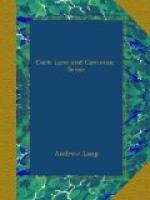in all degrees of culture, though one element is more
conspicuous in one place or mood, another more conspicuous
in another. In one mood the savage, or the civilised
man, may be called monotheistic, in another mood atheistic,
in a third, practically polytheistic. Only a
few men anywhere, and they only when consciously engaged
in speculation, assume a really definite and exclusive
mental attitude on the subject. The orthodox
monotheistic Mussulman has his afreets, and djinns;
the Jew, or the Christian, has his angels, the Catholic
has his saints; the Platonist has his demons; Superstition
has its ghosts. The question is whether all
these spiritual beings are only ghosts raised to higher
powers: or (in the case of deity), to the highest
conceivable power, while, even when this last process
has been accomplished, we ask whether other ghosts,
on lower grades, continue to be recognised.
Meanwhile the whole anthropological hypothesis, whether
valid or invalid, lies behind history, behind the experience
of even the most backward races at present extant.
If it be urged, as by Hume, that the conception of
a supreme deity is only a reflection of kingship in
human society, we must observe that some monarchical
races, like the Aztecs, seem to have possessed no
recognised monarchical Zeus; while something very like
the monotheistic conception is found among races so
remote from the monarchical state of society as to
have no obvious distinctions of rank, like the Australian
blacks. Moreover the evidence, on such difficult
points, is obscure, and fluctuating, and capable of
various interpretation. Even among the most backward
peoples, the traceable shadow of a monotheistic idea
often seems to bear marks of degradation and disuse,
rather than of nascent development. There is
a God, but He is neglected, and tribal spirits receive
prayer and sacrifice. Just as in art there is
a point where we find it difficult to decide whether
an object is decadent, or archaic, so it is in the
study of religious conceptions.
These are a few among the inevitable difficulties
and obscurities which haunt the anthropological or
evolutionary theory of the origin of religion.
Other difficulties meet us at the very beginning.
The theory regards gods as merely ghosts or spirits,
raised to a higher, or to the highest power.
Mankind, according to the system, was inevitably
led, by the action of reason upon apparent facts, to
endow all things, from humanity itself to earth, sky,
rain, sea, fire, with conscious personality, life,
spirit; and these attributes were as gradually withdrawn
again, under stress of better knowledge, till only
man was left with a soul, and only the universe was
left with a God. The last scientific step, then,
it may be inferred, is to deprive the universe of
a God, and mankind of souls.




